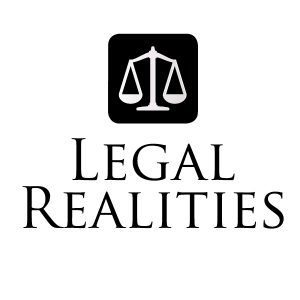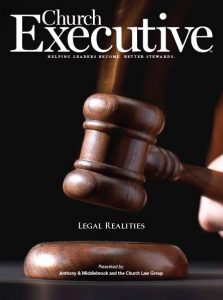
By David O. Middlebrook
 Churches are some of the most creative places on earth.
Churches are some of the most creative places on earth.
Every week, church staff is called upon to create sermons, songs, Bible and Sunday school lessons, music, books and teaching materials, and all other kinds of creative works. Churches routinely use media — such as movies and audio clips — to emphasize sermon and teaching points. They frequently make use of original art design, clip art, computer graphics and animation, photographs, words and lyrics for songs displayed on screens, dramatic readings, plays, and dance.
Churches are also frequent creators of new names for the church itself, new projects, church ministries, products, and services. The church’s creative works, ideas and concepts are what the law calls “intellectual property.”
So, if it’s “property,” then who owns it?

Generally, when a person creates an original work, that person is considered the author; however, there is an exception to this general rule called works made for hire. This rule comes into effect when an employee creates a work while on the job. If a work is a work made for hire, the employer — not the employee — is considered the author of the work. This scenario is commonly seen in churches where many pastors or other church employees develop sermons, books, worship music and other materials while employed at the church.
If a work is to be considered a work made for hire, then (1) the person creating the work must actually be a church employee, and (2) the employee must have created the work within the scope of his or her employment.
Keep in mind that even if an individual — such as a pastor — is treated as “self-employed” for federal income tax purposes, it is possible (and likely) that a court would consider the individual to be an “employee.” When it comes to copyright issues, courts have taken a liberal approach in qualifying an individual as an “employee.”
Churches should also consider the following factors when deciding whether a work was created in the course of employment:
• Was the work written or composed during office hours?
• Was the work created on church property?
• Was the work created using church equipment?
• Was the work created using church personnel?
 If the creator of the work is an employee, and it can be shown that the work was created “in the course of employment,” then the church has the right of ownership to the materials. However, if it can be proven that the works were created on the pastor’s own time, without using church equipment and personnel, there could be an argument that the pastor owns the copyright to the materials.
If the creator of the work is an employee, and it can be shown that the work was created “in the course of employment,” then the church has the right of ownership to the materials. However, if it can be proven that the works were created on the pastor’s own time, without using church equipment and personnel, there could be an argument that the pastor owns the copyright to the materials.
Rather than face a potential dispute as to whom the rightful owner of the intellectual property is, many churches and pastors choose to enter into works-made-for-hire agreements. This is a written agreement between the church and the pastor specifying that the materials prepared by the pastor belong to the pastor as his or her intellectual property. These agreements might even allow the pastor or employee to sell their intellectual property, such as books, on the open market.
For any pastor or other church employee who is currently developing materials — whether books, sermons or children’s curriculum — we recommend that the church and pastor enter into a works-made-for-hire agreement.
The same goes for music and song writers. Typically, when a songwriter creates an original song, the writer owns one-hundred percent (100%) of the song, until the writer conveys or assigns the right to a music publisher. However, if the songwriter is an employee of a church, then it is likely the song is owned by the church as a “works made for hire.”
The original “owner” can be the church, in a work made-for-hire arrangement, or the owner can be both the songwriter and the church through a songwriter agreement or employment contract. Many times, the church can operate as both the songwriter and the publisher, or the publishing rights can be conveyed to another publisher. In this situation, the song / copyright is assigned to the church with the agreement that the songwriter will always receive fifty percent (50%) or some other amount of the royalties depending on the details.
For purposes of understanding how to set up your church as a music publisher, it is helpful to have a general understanding of how songs are written and how royalties are collected. Understanding the music business takes some effort, and there are a lot of players and moving parts; thus, finding competent legal counsel to help you is invaluable.
In order to set your church up as a music publisher, the church can simply file a “doing business as” (d/b/a) in accordance with your state / county rules and simply operate the church’s publishing as a ministry of the church. This preserves the non-profit and tax-advantaged nature of the activities. As long as the publishing ministry is narrowly focused on Christian music, then this is very likely to be deemed consistent with the church’s charitable purposes and will not raise issues with the Internal Revenue Service.
Of course, there are some situations where a separate entity may be used to house the publishing ministry, but the majority of the time the model explained above is used — even in large churches with a substantial music and publishing ministry.
Regardless of how the church chooses to structure it, we strongly advise using the services of competent legal counsel to handle the setup and songwriter agreements, as well as any other legal details required to establish a church music publishing ministry.
We’re just getting started
You probably have many more questions about the creation and ownership of intellectual property. To start, take time to analyze your needs and the church’s philosophy in publishing sermons, books or music, and staff or pastoral ownership of that intellectual property.
The most important part of intellectual property ownership is good communication with the church’s board, and the employees creating the intellectual property. A clear understanding of expectations, along with written agreements, will limit conflict and confusion around who owns created material.
The materials in this article are provided for informational purposes only and do not constitute legal advice. This article is intended, but not promised or guaranteed to be current, complete or up-to-date and should in no way be taken as an indication of future results. Transmission of the information in this article is not intended to create — and the receipt does not constitute — an attorney-client relationship between sender and receiver.
David O. Middlebrook is a founding shareholder of Anthony & Middlebrook and the Church Law Group in Grapevine, TX. His clients include high-profile charitable and religious organizations, both domestic and international.



I’m concerned about intellectual property rights for pastors and church leaders . Also bylaws .
Thanks for sharing how important good communication is with the employees who are creating the intellectual property. They would know more about it than anyone else. That is where I would get information from first and then consult with a lawyer.